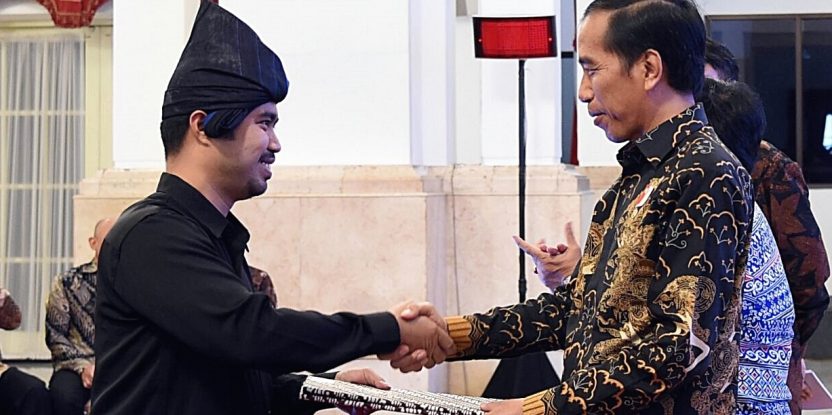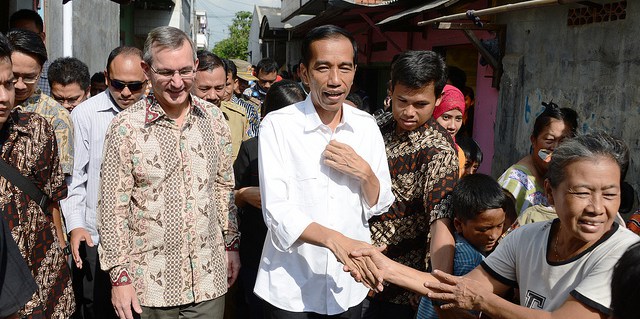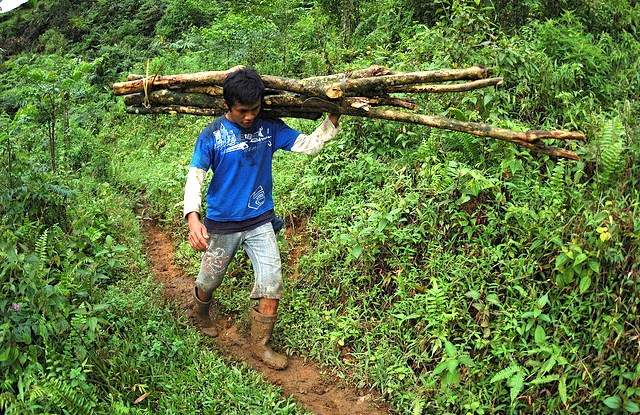
Indonesia has had a long history of conflict over control of its massive areas of tropical forests that are spread across the many thousands of islands that make up the archipelagic nation. Declaration under former Dutch colonial rule of state ownership of all forests was rarely accepted by the millions of people who lived in them and who had managed them sustainably for centuries.
Widodo’s recent formal handover of titles is a highly symbolic step in the long fight for recognition by indigenous communities, whose customary rights remained contested by the new nationalist government after independence in 1945 despite being enshrined in the founding constitution. The islands now known as Indonesia have long been home to thousands of distinct ethnic groups with their own languages, customs and identity.
“The recognition of customary management of forests is not restricted to the acknowledgment of communities’ rights as stated in the 1945 Constitution. Recognition also means an appreciation of Indonesia’s original values and its identity as a nation,” said Widodo in his opening speech at the Declaration of Recognition of Indigenous Forests event held at the presidential palace in Jakarta, Indonesia, on 30 December 2016.
The event was attended by international and national figures, including representatives of the nine indigenous communities receiving customary titles. Among them was the leader of the Kajang people of South Sulawesi, Andi Buyung Saputra. Abdullah Mojaddedi, representing the Government of Canada, was also a special guest along with James M. Roshetko, senior agroforestry scientist with the World Agroforestry Centre (ICRAF) and the leader of the Agroforestry and Forestry in Sulawesi (AgFor) project. AgFor, supported by the Government of Canada, assisted the Kajang people in their struggle to achieve legal recognition of the management of their sacred forests.
A SHINING EXAMPLE
Of the nine recipients, the Kajang were noted by Widodo as a national model from which others could learn. The road leading to recognition was long and fraught, with conflict between the Kajang, different levels of government and the private sector over control of the forests.
The fight began when a previous national government had changed the management status of the Kajang’s forests from ‘indigenous’ to ‘production forests with limited uses’, bringing them under the management of the government for various purposes, including allocation to the private sector for the development of rubber plantations.
Roshetko explained that, “Good coordination between AgFor’s partner organizations, the Kajang community and local government was a key to assisting the creation of the Bulukumba District Regulation on Inauguration, Recognition and Protection of the Indigenous People of Ammatoa Kajang. The regulation has led to the current point: recognition of indigenous management of forests, issuing of the presidential decree, and handover of title.”
Andi Adriardi, a member of Balang, an NGO working with the AgFor project that helped the Kajang achieve ownership of the title, said, “The Indonesian national government identified the case of the Kajang indigenous forest as a good lesson. It is a well-managed forest where the Kajang have developed a set of local regulations that affirm, recognize and protect based on traditional management, which is supported by modern spatial mapping.”
Even though the Kajang’s forests are relatively small and isolated, the struggle to protect them has had a great impact on the Government of Indonesia’s policy. Kajang’s forests are home to a wealth of endemic species that provide important cultural functions for the people. These forests also store carbon. Drastic deforestation in recent decades has increased carbon emissions, and subsequent agricultural uses have struggled to maintain soil fertility and productivity owing to increased erosion and general degradation of the land that followed the loss of the forests.
Saputra, in his acceptance speech in response to the handover of title by Widodo, noted that, “Our traditional wisdom has played an important role in managing and preserving our forests. This has contributed to keeping our Earth greener and reducing the negative impacts of climate change.”
The process toward resolving the conflict and achieving the return of customary title had begun some years before when, in 2008, the Bulukumba District Forestry Agency, assisted by Hasanuddin University, took the initiative to draft a regulation about the Kajang’s forests. That first initiative faced many challenges and for various reasons could not be implemented.
MARRYING RESEARCH WITH POLICYMAKING
In 2012, the AgFor project started in South Sulawesi. One of its objectives was to increase the awareness, understanding and technical capacity of participatory governance of agricultural land and forests. Picking up on the government and Kajang’s desire to resolve the conflict, experts in governance from the Center for International Forestry Research (CIFOR) provided training in collaborative processes to address complex problems, conflict-resolution techniques, participatory mapping, database development and analysis.
Participants included representatives of the Kajang leadership and other community members, village and sub-district government staff, members of the district’s Forestry Agency and Tourism and Culture Agency, the Legal Bureau of Bulukumba, and several NGOs, such as Aliansi Masyarakat Adat Nusantara South Sulawesi and Balang.
“Working together with the Bulukumba District government, we were all able to change the process of developing regulations from exclusive to inclusive,” said Agus Mulyana, senior governance researcher at CIFOR. “We opened the door to understanding and creating stronger regulations. Our collaborative efforts led to the emergence of the Bulukumba District Decree No. 760/VII/2013 regarding the Formulating Team for the Draft District Regulation for Recognition of Customary People in Bulukumba.”
That process started with forming a consultative team made up of representatives of all the interested parties, to support the drafting of the regulation to ensure it met everyone’s needs. AgFor partner Balang conducted various studies, such as a stakeholder analysis, categorization of tenure and the classification of formal and informal access rights. These studies provided important information to the many people who needed to be included in what was described by those involved as a ‘robust’ participative approach to drafting a complex regulation.
Moira Moeliono, a senior scientist at CIFOR working on the project added, “The district regulation is not the end of the work, but rather the beginning of a long journey to improve forest management and indigenous rights. After the promulgation of the district regulation and recognition by the presidential decree, everyone needs to continue to move forward to resolve other matters. Regulations need to be created that link management of the customary forests to watershed management and strengthening the indigenous institutions.”
The recognition of the right of indigenous people to manage forests by the Indonesian government is an important step in agrarian reform as part of the Nawa Cita, Widodo’s program of nine main strategies to address long-term problems afflicting rural communities, such as poverty, inequality and lack of paid employment. Widodo stated that transferring management of customary forests to indigenous people was part of Indonesia’s social forestry program, which seeks to bring 12.7 million hectares of land under community management.
*This article was adapted from its original form as published by ICRAF on Agroforestry World.
We want you to share Forests News content, which is licensed under Creative Commons Attribution-NonCommercial-ShareAlike 4.0 International (CC BY-NC-SA 4.0). This means you are free to redistribute our material for non-commercial purposes. All we ask is that you give Forests News appropriate credit and link to the original Forests News content, indicate if changes were made, and distribute your contributions under the same Creative Commons license. You must notify Forests News if you repost, reprint or reuse our materials by contacting forestsnews@cifor-icraf.org.


